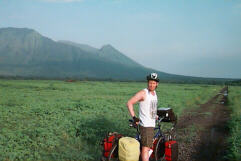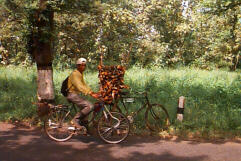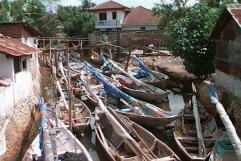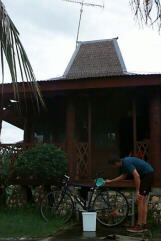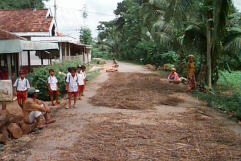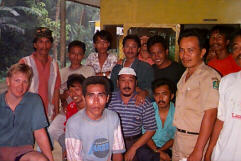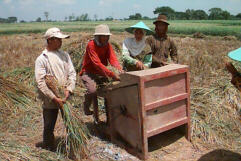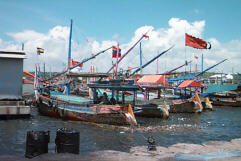| 1997 CALIFORNIA TO FLORIDA CA to AZ AZ to NM TX 1 TX 2 TX & LA LA, MS, & FL FL WESTERN EUROPE Spain & French Pyrenees France –Bordeaux & SW Coast 1 France –Bordeaux & SW Coast 2 France – Notre Dame des Cyclistes England Belgium & Holland Germany NORTHERN EUROPE Denmark Sweden Finland Estonia, Latvia, Lithuania EASTERN & SO. EUROPE Poland Slovakia and Hungary Croatia, Slovenia & Bosnia-Herzegevina MIDDLE EAST Turkey Cyprus Israel & the West Bank Zealot City Jerusalem Syndrome Jordan Egypt 1998 OTHER VOYAGES |
TRIPLOGUE
29 March, Bama to Situbondo/Surabaya, 85km (a) I remember reading an illustrated book on the eruption of Krakatoa as a kid and being intrigued by a green island full of volcanoes, rice and strangely-clad people. I searched for Java on my globe (my favorite childhood toy) and was pleased to find it almost directly opposite my home in snowy, volcano-free Wisconsin. I’d put my finger over the bumpy little squiggle (it was a relief globe) full of cities with bizarre names, wondering how many people lived underneath. For Andrew at age eight, Java represented all that was exotic and unknown. I felt oddly connected to the place then, and I still do. Waking up on my picnic table bed this morning however, I hardly felt I was in one of the most populated places on earth. Lizards howled, birds screamed, monkeys crashed and deer barked. And the nearest village was fifteen painful kilometers down a miserable excuse for a road. After packing our stuff I took a sunrise walk through the muddy forest and saw a surprising amount of wildlife: an orange cat-looking beast, a wild piglike substance with a long snout, and yes, barking deer. As satisfying as these sightings were, they still didn’t seem worth taking such a painful detour; the mere thought of riding fifteen hellish kilometers to a cup of coffee made me groan aloud. Fred said the road didn’t seem as long going out as it had coming in. It was full of students from Yogya –most of the girls wearing ultra-Islamic jelbebs over their heads—out for a stroll. They were staying at the other "accommodation" a few kilometers inland from us and kept to the road in order not to sink into the mud. I heard more than one whisper "gila" (crazy) as we bounced slowly by, and I could hardly disagree with them. When we reached the little village of Wonorejo an hour and a half later, we were both covered in sweat and grime. It felt oppressively hot, and the clock on the wall of the nasty little café in which we took breakfast showed that it wasn’t even eight a.m. "Are you going to Bali?" everyone asked us (often abbreviated simply to "Bali?" accompanied by a look of astonishment). No one could fathom what two white boys would be doing in the backwoods of East Java. It promised to be a long day. From Wonorejo the road climbed high into a lush forest of teak, appreciably cooler and uninhabited but for the occasional park ranger or woodcutter. We paused at what appeared to be the top of the ridge, volcanoes clearly visible on either side of us, and one such woodcutter –a wild-looking guy dressed in raggedly clothes—stopped his rusty old bike to gawk at us, remaining silent unless responding to our questions. In just barely comprehensible Indonesian, he told us that he lived in a village down the hill and that a headache was driving him home early. On the way down we stopped a couple of times and he’d stop too, observing us as if we were exotic birds. Back in the lowlands the traffic picked up considerably. Apart from the occasional bus or truck screaming by, most of it was pedal- or animal-powered. Horse carts called andong (grander than Lombok’s cidomo) awaited passengers at every intersection; becaks transported people, animals and goods; crop-laden oxcarts known as "Nippon chariots" (due to their prevalence during the Japanese occupation) ambled slowly by. As cyclists, however, we belonged to the vehicular majority. Like us, most bikers were loaded down, often with ridiculously cumbersome burdens which made us feel streamlined in comparison. Asembagus was our first Javanese town. The masses of people, animals and vehicles, combined with the oppressive heat made it a rather overwhelming experience for both of us. From here we turned off the main road to the port of Jangkar, where ferries supposedly leave for Madura every day. We had been hearing vastly varying versions of this ferry’s schedule since arriving on Java, so it came as no surprise that the boat wasn’t running today (either due to the Hindu holiday called Ngepi or the fact that it was Sunday, depending upon whom you talked to). Would there be a ferry tomorrow? "Yes", "No" and "Maybe" came the responses, and when I asked what time it would leave I got answers anywhere from six a.m. to four p.m. Indonesia is a place where the notion of linear time is still in its infancy, where the locals take pride in the concept of "jam karet", or "rubber time", which dictates that events occur when they are meant to. Not thrilled by the prospect of hanging around a sorry harbor for a day or more (with the nearest accommodation thirty kilometers off), I proposed to Fred that we ride to the next town and investigate bussing it to Surabaya, where more reliable transportation to Madura could be found. The road to Situbondo was busy and hot, but trees lining it provided shade and we had a stiff tailwind the whole way. Once in town we stopped at the first restaurant we saw and had a delicious meal of king prawns, washed down with numerous bottles of ice cold water. At the nearby bus terminal, we attracted the usual crowd, but within minutes we had worked out a deal for getting us and our bikes all the way to Surabaya, some 200 kilometers away. It cost three dollars total, a buck for us and two bucks for the bikes, which were very conscientiously placed behind the bus’s rear seats by a trio of uniformed employees. While the trip presented a fair share of cultural insights, Fred and I hope that it constitutes our last experience on a trans-Java bus. As soon as the bus left the terminal the windows went up; the locals apparently find the cooling breezes chilly and prefer to remain sweltering. And even though our bus was designated "ekspres" it stopped –or at least paused—every few hundred meters for people to leap on or off through the rear door, next to which we were seated. At the scheduled stops in large towns and cities (of which there are many in Java), merchants and buskers would invade the vehicle, often staying on until the outskirts of town, where the bus would slow –but never stop—for them to leap off. Seated in the middle of the row, Fred was spared the terror of witnessing the recklessness of the driver, who casually ran anything smaller than us off the road, including oncoming traffic. In spite of the frenzied activity, there prevailed a sense of gotong royong, a Javanese concept meaning "mutual respect and support." The passengers, the staff, even the little urchins selling peanuts –everyone was almost painfully polite to one another amid the madness. In my grimy, smelly cycling clothes, I felt unspeakably kasar, or course, in comparison. Most of our fellow passengers merely looked at us curiously before politely averting their gaze, though a few worked up the courage to practice their English on us. One young peasant seated in front of us attempted a vocalization of his appreciation for our bikes, which came out as "Speedle? Good?" At one point of the ride we passed a power plant more gargantuan than I’d ever imagined possible, and picked up what seemed like half the employees to cart them to their nearby village. Squished up against the window to regard a smeary sulfur-colored sunset, I could think only of the bath I’d be enjoying in Surabaya, still three hours off. It was nighttime when we finally arrived at our destination, and both Fred and I felt more spent than if we had pedaled the whole way. With the assistance of the amazingly servile bus staff, we assembled our bikes and found transportation into town in a funny little vehicle called an "angguna", an odd hybrid of pickup truck and minivan. Like Jakarta, Surabaya is a huge, huge town with one main street running through it north to south. For a long time we were part of this immense river of humanity leading to the center of town. The hotel we had picked turned out to be totally acceptable, with decent rooms and great staff, and a screaming deal at less than ten bucks a night including breakfast and dinner, which we fell upon like a couple of vultures.
Rusak Road to Baluran Teak transport
31 March, Surabaya to Camplong, Madura, 86km (f) This morning’s check-out procedure was yet another example of Indonesian efficiency. Though we’d asked for the bill before breakfast it didn’t appear until we began to walk out the door in disgust with their inattentiveness. "The computer printer is rusak," was the excuse du jour. We got into Andy’s favorite form of transportation and headed for the port once we’d sorted out our obligation to the hotel. The angguna was the logical choice for us; riding in Surabaya did not appeal to me at all. The smog and traffic made me feel more awful while walking around; I couldn’t imagine riding in it. Arriving at the ferry terminal we were immediately swarmed by folks wanting to help us, but none was able to tell us from where or at what time the boat left. They were able to ask the traditional six questions that everyone always asks. I am very close to being able to answer all of them in Indonesian at this point. They are:
( 7. How much did you pay for your bikes? Is sometimes asked by a few crass individuals.) We joked about inventing new answers to them each time. Andy even told someone that we were Japanese once. They very seriously commented "oh, Japanese, I see." Once we boarded the twelve-cent ferry we were surprised by how many asked us "Where are you going?" while on a ferry to Madura. It seemed obvious to us. Our supposed twenty-minute ferry ride turned into a fifty-minute ferry ride as we stood in the harbor waiting for a place to dock. I wondered if our boat, more rust than steel, would actually survive the journey. If it didn’t I was not looking forward to a swim in the absolutely filthy harbor. Large chunks of debris clunked against the boat as the morning sun began to bake us. Finally we docked and the adventure began. As soon as we rode onto the pier it was obvious that we were dealing with a different breed than the Javanese. The Madurese are loud! The laughed and jeered at us as we entered the town. Many using their traditional greeting "Wh-oy!" Maybe it is a greeting, perhaps something else, we never managed to get a translation of it. It could likely mean, "you are a psycho", judging from the puzzled looks we got from the Madurans as we passed them on the road. Some would just stop in their paths and stare blankly at us. Still others couldn’t even cope with our presence and would simply look away. Clearly they are not as sophisticated as the Javanese. In port we stopped at a Maduran 7-11, bought a couple of bottles of water and paid what the shopkeep demanded. As we were pedaling off the woman’s neighbor had managed to convince her that she should have fleeced the buleh-buleh and they shouted after us that we should stop and pay them more. We did not run back and give her more money, but did have a good laugh at how they might improve their bargaining tactics. Andy immediately found that he had more difficulty communicating with the Madurese. Few spoke proper Bahasa Indonesia. On top of that it was just hard to think it was so hot. Sweat poured off of us as we ogled the unusual roofs of the houses. Influenced by the island’s bull racing pastime, many houses had high pitched tiled tops with bullhorns at the peaks. Though seemingly a simple people, they were very friendly, more so than the reserved Javanese. Riding along the marshy shoreline everyone yelled "Wh-oy," often almost startling me off of my bike. As we came to villages the channels that joined the inland waterways with the sea were choked with colorfully painted fishing canoes. Also well trafficked were the centers of each village. So filled with traffic of all sorts it was hard to get our bikes through --much less the big busses, becaks, bemos and foot traffic bearing huge loads. An especially big village, Blega, was where we arrived at lunchtime. It was so ugly we nicknamed it Blecha. Instead of lunching we had a little snack while chatting (think of the six questions in English) with a lad who introduced himself as "Sam". He tried his best on us, using slang like "catchyah later," as we parted. Huge black clouds began to collect over the center of the island and we raced along a busy road, hoping to beat the sure-to-come rain. We finally arrived in a busy village just as the clouds were the most pregnant. Feeling an overwhelming sense of brotherhood we rode down the main street in the company of an enormous swarm of school children on their way home. Parking our bikes under the awning at a warung (a little restaurant) the sky dumped its load. Tasty goat sate over white rice went down easily as we waited out the storm. We had to leave the restaurant quickly after eating. Both of us were desperately in need of relieving ourselves and neither of us could figure out how to use the toilet at the warung. Usually you find a squat-toilet in a kamar kecil (bathroom). There seemed to be none in theirs, which mysteriously had a staircase that led to a mini-mosque upstairs. The closest thing to a toilet was a well in the center of the room that was so deep I felt like I was looking into the center of the earth when gazing down into it. Though tempted, I decided to hold it rather than peeing into the well. After lunch we went in search of ice cream. On our way I found myself asking the question: where had all the bicyclists we had seen earlier gone? As we slurped our quickly melting treat a parking mafia dude tried to shake us down for one thousand rupiah for our bikes. We laughed, thinking it outrageous. So did the shopkeeper who chased him off. We zipped down the road dodging traffic, rejuvenated from our little rest. A little scary moment on the road made me consider what I’d do if we had a medical emergency here in Indonesia. Thankfully I didn’t have to exercise my strategy. We’d planned to spend the night at the "beach". Arriving in Camplong many adjectives came to mind for a description of the muddy stretch of sand, none of them appealing. Just past the oil storage tanks and distribution center lay our swampy motel. Our bungalow’s plumbing dumped on the ground underneath the wooden shack, providing a perfect breeding place for the mosquitoes that would be our company at dinner and in bed that night. Before dinner we washed our bikes and then walked through town. Strolling post-adolescent fruit saleswomen offered us more tropical pleasure than a rambutan. Returning to the hotel we found that the evening would deliver more entertainment than we’d know what to do with. It was hard to tell whether the wailing from the mosque or the hotel’s karaoke bar was more offensive. Both went non-stop until close to midnight.
Maduran boat-jam Bike mandi
1 April, Camplong to Sumenep, 81km (a) I love the rupiah An elaborately-produced music video in which a little girl sings these lines is played constantly on Indonesian television. Apparently the government is concerned that people will abandon the national currency in favor of the more stable dollar (ironically, immediately following last night’s broadcast of "I love the rupiah" was an ad for DHL air freight, with prices quoted –naturally—in US dollars). In any case, the propaganda campaign is enjoying some success in Madura. The first vehicle that passed us this morning had a big decal in the back window saying "Love the Rupiah." And later in the day we heard some little girls singing the song on their way back from school. Fred and I love the rupiah, too. Especially at ten thousand to the dollar. We got another extra-early start this morning, hitting the road at half past six. The little coastal villages we passed through on the way to Pamekasan were teeming with economic activity. Pamekesan itself is Madura’s capital and biggest town, full of impressive government buildings in the "horny" Maduran style and more becaks than you can shake a stick at. We didn’t even bother to stop here, though, heading straight for the hills and a quieter road. A long climb through the jungle brought us to a lush plateau. We saw a number of tortured cows here. Always in pairs and immobilized with a rope through their nostrils and their front legs up on blocks, they were obviously being raised for the kerapan sapi (bull races) for which the island is famous. We learned later that the poor animals are kept this way in order to teach them to stand more upright, which allows them to run faster. Agricultural activity seemed especially intense in these highlands. Signs of the rice harvest were everywhere (e.g. much of the road we took was used for drying the precious grain), as well as an abundance of other crops: corn, beans, fruit, soy. Less cultivated were the locals, or so we learned when we were caught in the rain outside the excellently-named village of Gulukguluk. Just as it began to pour, we ducked into a little warung filled with the usual assortment of (exclusively male) idlers --becak drivers, unemployed lowlifes, cops and uniformed civil servants with nothing to do. Our unexpected arrival there caused great excitement; they all started yelping at us at once. I turned to Fred and told him it was one of those moments I wish I didn’t speak the language, and that I was looking forward to Vietnam, where all we’ll be able to do in this type of situation is smile and nod. Instead, I had to answer the usual questions, plus a barrage of others, all posed to me in a rapid-fire, excited mixture of Indonesian and the local dialect. As the storm and the interview wore on, the topics of conversation inevitably turned to sex. Several of our new friends were very keen on accompanying us to a whorehouse in town. "It’s cheap! Only 10,000 rupiah!" One guy sitting next to me was more interested in coming back to my hotel for illicit purposes (this indicated by a suggestive hand gesture and some not-so-subtle touching). He also asked me if in America there were drugs that he could get to make his penis longer (obat untuk memperpanjangkan kontol). Then came the usual requests for gifts: "Give me your glasses"; "Let’s trade watches as a souvenir of our friendship"; "I like your bracelet; can I have it?" The rain let up not a moment too soon, and the twenty remaining kilometers into Sumenep passed quickly. While Pamekasan is the administrative capital of the island, Sumenep is Madura’s cultural heart. It’s an attractive, prosperous-looking town, full of trees and painted yellow. Becaks clogged the lively shop-lined streets, and many people offered their assistance. We found the town’s premier hotel and decided to splash out for the "ultimate VIP" (pronounced "veep") suite, which included a living room, a garage for our bikes, a real bathtub and toilet, and even a sink. Of course, hot water wasn’t an option, and our requests for a second set of sheets were met with incredulity. The Sumenep town tour didn’t take long. Its sleepy palace, or kraton, was abandoned by the royal family in the fifties for lack of funds and is now occupied by the bupati, the region’s head honcho. A dude in a uniform gave us a tour (in decent English, no less) of the crumbling old place, its "pleasure garden" (now a mildewed empty swimming pool), and the dusty museum filled with random objects. We noticed in the guest book that we were the first visitors in weeks. After a forgettable dinner of mysterymeat on rice, I decided to get a massage while Fred opted for a quieter evening back in our luxury villa. The restaurateur told me their weren’t any masseurs in town, but a helpful becak driver told me he knew someone, but I’d have to go to their place, in a kampung about a kilometer away. He led me to a dark little bamboo hut full of smiling boys obviously nervous in my presence. A moment later a middle-aged woman appeared, carrying a massage mat and a jar of oil with remarkable poise. While she admitted I was her first buleh client, she wasn’t nervous in the least, and went right to work. Would I mind if she walked on me first? It was the custom, she explained. "Sure, I’ll give it a try." As I write this almost two days later, my calves still scream from the experience. Asmara –that was her name—proceeded to give me a very complete and professional, often painful massage. I learned that my audience of a half dozen or so all worked as becak drivers, and that eight of them shared the house. At one point an irritating neighbor came by. Dressed in western clothes and rattling off rapid-fire questions in bad Indonesian, he quickly got to the "how much did you pay for your shoes? Why don’t you give them to me?" phase. Tired of such behavior, I dressed him down pretty thoroughly, causing him to lose face and thus stunning my audience. After the pesky neighbor slunk away into the gloom, my hosts could talk of little else. As in the warung earlier in the day, the becak boys began stroking my skin and telling me how they wanted me to spend the night. They wanted to know the English names for all the parts of my anatomy, which gave them excuses to touch me some more ("belly button" was met with a great deal of hilarity). In their strange dialect, they also made bets as to how much money I’d give Asmara, not knowing that I’d studied enough Javanese to understand them. Still, they were far more polite and sweet than their crass middle-class neighbor, and I genuinely enjoyed talking to them and getting a glimpse into becak culture. All of them came from big families on the north coast of the island, too poor to afford anything beyond the most basic education. My driver –who had stuck around to drive me back—had been driving his becak for twenty years. They all wanted to know if there were becaks in America, and when I told them that they exist in Mexico, but the drivers are in front, they were stunned. In the complex hierarchy of Javanese culture, it is absolutely inconceivable that the client ride behind. Back at the hotel, I was surprised to find it very happening, like a carnival, with guests sitting outside their rooms and indulging in a variety of pleasures. An androgynous Balinese dwarf who spoke passable English asked me to join him for a glass of whiskey; a frightening, buck-toothed queen offered to give me a massage; and a group of drunken truck drivers insist I sing them an American song. Pleading fatigue and a very real need to urinate, I escaped to our VIP refuge, finding Fred awake. We exchanged tales of our respective adventures (he’d walked back from dinner through the alun-alun --central square-- and found it very cruisy). I fell asleep dreaming of my tukang becak friends, thinking how we’d be passing through their poor villages the next day. Alas, our journey along Madura’s north coast was not meant to be. We awoke to the sound of a downpour that promised to last all day. After breakfast and packing it was still raining, so we hopped into a becak and headed for the bus terminal, where it took all of two minutes to charter a van all the way to Surabaya (nearly 200 kilometers away) for under ten dollars. Our driver was a terror, using his horn constantly and passing everything in sight within millimeters. Though I kept insisting we weren’t in a hurry, he got us to the port in record time. Why he insisted on taking us all the way to Surabaya remains a mystery, since the boat ride across the narrow Straits of Madura is nothing short of excruciating. Maybe he has a girlfriend here? In any case, he got us to our hotel in time for lunch. Scott in Jakarta had clued us in to an ultra-discounted rate for Surabaya’s most luxurious hotel, the colonial-era Majapahit, which has been operating at a 3% occupancy rate since the advent of the monetary crisis. For thirty bucks a night including breakfast, we’re staying in one of the most beautiful hotels I’ve ever seen, built by the Dutch in 1911 and exquisitely restored. It’s hard to believe that gritty Surabaya lies just outside this tranquil oasis. Fred says he wants to stay here for the rest of our trip. (even better, I’d like the hotel to follow us along the way – f)
Traffic-assisted soya bean husking (beats whacking it against a tree) Hanging with the boys in Gulukguluk
5 April, Surabaya/Gresik to Tuban, 105km (f) Today as I write I notice that our trusty computer is taking a beating. The problem with the screen, whereby half has vertical lines running through it obscuring most of what is displayed, is more and more persistent. When we arrived in Surabaya I noticed that the hooks that hold the screen shut had broken off. Now the menu function key (F10) is sticking. I wonder how much longer before we’ll have a full-scale disaster with it. Though I’ve applauded Compaq for the quality of the construction of the beast until now, I fear that our luck may be running out. Another annoying problem is one that should have been covered by the warranty. I reported to Compaq that the battery was losing its charge prematurely while we were visiting the States. Their phone representatives promised me that a new one was on the way, even quoting me a ship date. It never arrived. Now I think that the bumpy roads might get the better of our electronic slave. Leaving Surabaya we decided to take an angguna out of town in order to avoid the traffic and resulting exhaust fumes. Arriving in a small town a few minutes later we unloaded the bikes and hit the road. Sweat rolled off my nose just from putting my bags on my bike. I’d felt like I had grown soft after just two days off my bike. Having stayed for three nights at the most comfortable hotel I’d been at in fifteen months I felt suddenly more sensitive to Indonesia. All the sights, sounds and smells seemed more intense after the bland comfort of a big comfortable bed and air conditioning. Despite the intensity it was a pleasure to be back riding again, especially because the roads were so calm. Most of the traffic, like us, was pedal powered. We even discovered a new device that derived its energy from pedaling. The Javanese separate the rice from its stalks using a machine that is powered by the remains of old Dutch bikes. It is a marked improvement over the method used in Bali, Lombok and Madura where they manually beat the rice against a crudely fashioned hobby horse. Another big rural event was the goat markets. The center of almost every village was filled with people and their soon-to-be bought or sold goats. S’lamat pagi, the normal morning greeting, I altered to "s’lamat baaah-gi" in honor of the constant bleating we heard. I remember the middle of the day to be unbearably hot. Through rolling hills and across rice paddy we pedaled, I was nearly unconscious from the heat when we arrived at the coast. We took a little detour to a fishing harbor where we ogled the brightly painted boats. Almost as colorful were the fish being offloaded from the vessels in large baskets. The dock workers suspended two baskets, one on each end of a pole, and carried them to the covered market. After purchase the fish is packed into huge cylindrical baskets mounted on the back of a bike or motorcycle. Before the purchaser leaves ice is ground and packed into the baskets. I contemplated diving into the while pile of slush in front of the grinder in order to cool down. Finally we came to Tuban, our planned oasis for the night. Andy had thought it would be a miserable backwater, but it turned out to be a very pretty little town. Perhaps the cleanest in Java with its pristine streets and white and blue painted curbs. I could scarcely enjoy it because I had driven myself over the edge and was suffering from the heat. We went in search of a place to stay. The first seemed exorbitantly priced for Indonesia. It was about the same as what we had had paid for the hotel in Surabaya but not nearly as nice. We rode another five kilometers to see the yang paling mewah (the most luxurious) hotel in town, only to find it cheaper. In opposition to his normal parsimony Andy could not settle for the cheaper because it did not have a pool. We pedaled back to the first. After a dip in the aforementioned pool I was no cooler. In fact I felt worse. Somehow I managed to finish Palimpsest by Gore Vidal before falling into a deep shivering sleep in our room. While I slipped into my coma Andy toured the town. When he returned to wake me for dinner I was feeling my worst. I dragged myself from bed and we walked through the little residential streets to the alun-alun (town square). At one point we got lost and an elderly ibu (literally "mother", but commonly used as a term of respect for a woman) gave us directions and then followed us to make sure we followed her instructions. We stopped in a warung (little restaurant/shop) for dinner and I was unable to eat. Even white rice made me feel nauseous. One great thing about Indonesian towns is the variety of food to be found in the street. Kaki Lima (food carts, literally "five legs", two for the pusher and the three wheeled cart make five) dispensing all kinds of delicacies rattle around at all hours. Each has a type has a different noise making device to identify what is passing. Bread carts with horns, Bakso (soup with fish balls) a little wood bell and numerous others clang and honk as they pass. It reminded me of our neighborhood glass repairman in France. He’d walk down the street with his little backpack of tools and panes shouting "vitrier!" I always thought he was an incredible throwback from medieval times only to have it all put back in perspective here. Andy loaded me into a becak and got me back to the room where I fell into a deep sleep, dreaming restlessly of the green shades of Java.
Javanese stationary bike Brondong's colorful port
|

